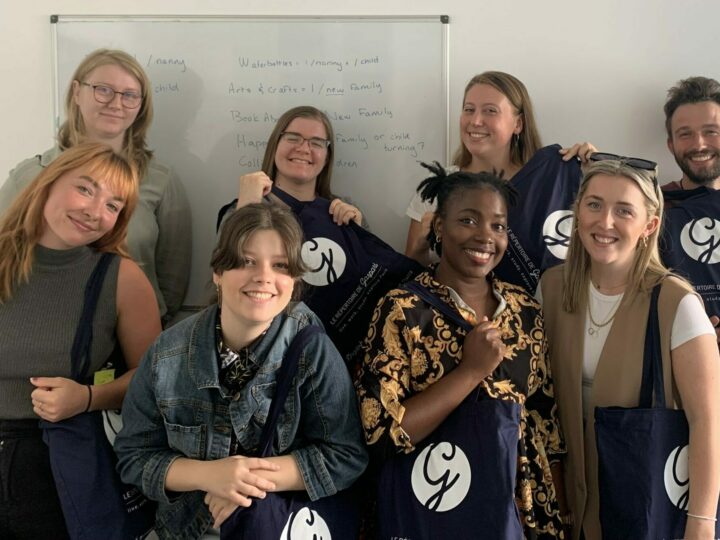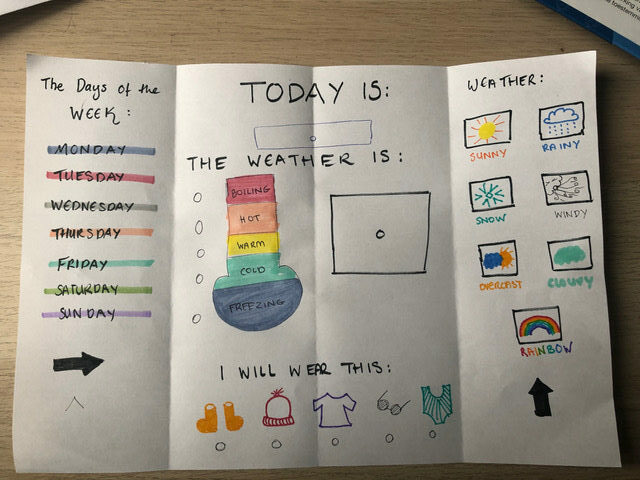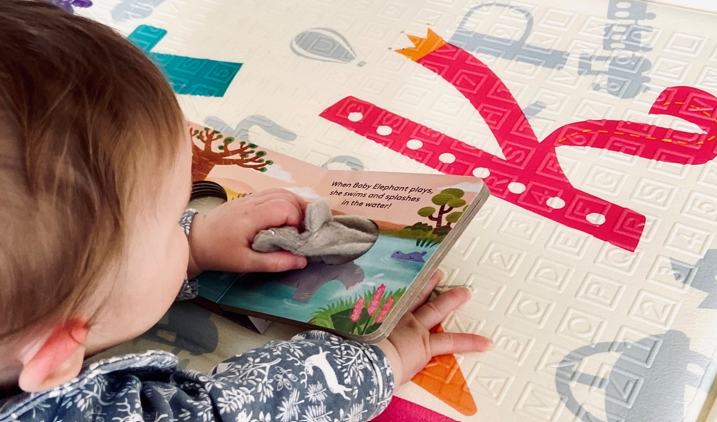
Have you ever found yourself singing a song without actively learning it? You know that one random song you heard on a random Sunday and somehow you keep hearing it and before you know it, you catch yourself humming it mindlessly on your way home from school. And then, one day you’re singing along to words you couldn’t even make sense of, which naturally leads you wanting to know the meaning of said words. Personally, I’ve known how to sing a song in English before I could learn and understand the language itself. I’m originally from Madagascar and my second language is actually French and not English, so at the time I would mostly imitate the sound the artist was making and doing so with confidence as if I knew what I was talking about. Between us, I still do that sometimes when confronted to a mouthful or complicated lyrics that I won’t ever be able to pronounce properly otherwise. I believe that’s where my interest in learning English started.
Throughout my training for the CAP AEPE at Paris Institute of Childcare Training combined with my work experience with Le Repertoire de Gaspard, I have learnt that babies essentially acquire language in a similar way, whether it’s their mother tongue or a second or third language.
With this in mind, it is important to understand how babies’ brains work. Did you know that they operate 10 times (whereas an

adult’s brain is only 3 times) faster than the worldwide internet network as they absorb all sorts of information surrounding them every seconds (via sounds, touch, shapes, etc.).
This is very overwhelming for them, especially during their first months, and that is why they need a lot of rest and therefore, sleep quite a lot.
As we grow up, we learn certain things and forget some other based on how often we are exposed to them until we become an “expert”. To put it simply, the more we repeat something, the more it sticks with us, whether positively or negatively. This represents the greatest opportunity for learning and why it is highly encouraged to introduce a second language (in our case, English) at an early age. The earlier, the better.
Babies’ learning experiences are mainly focused on their motor and sensory development. Therefore, they learn a lot by simply moving around, hearing, seeing, feeling, smelling and tasting or just by exploring their surroundings. And while they only start to say actual words around 12 months, they still communicate non verbally through their facial expressions, their cries, their smiles and their gestures.
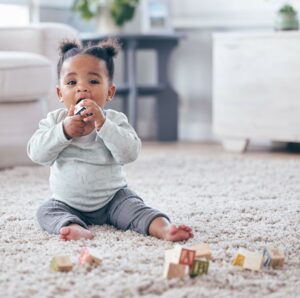 However, language acquisition starts from the moment they are born (we can even talk to them while they’re still in the womb as they can already hear sounds and can identify their mother’s voice in there). Interacting with them regularly by verbalizing everything we do or what they see for example is really important as it is the very first form of socialization they would encounter and that would later on allow them to express themselves and connect with others. It also helps them anticipate what’s happening with or around them.
However, language acquisition starts from the moment they are born (we can even talk to them while they’re still in the womb as they can already hear sounds and can identify their mother’s voice in there). Interacting with them regularly by verbalizing everything we do or what they see for example is really important as it is the very first form of socialization they would encounter and that would later on allow them to express themselves and connect with others. It also helps them anticipate what’s happening with or around them.
At first, they will mostly just familiarize with how the words sound and the tone in which they’re said and as we keep saying them, they will progressively start to associate certain words with certain events, objects, person, place, etc. It’s approximately around 2 years old that they really enrich their stock of words and start making sentences by repeating and imitating what they’ve heard daily or by pointing things and naming them.
As English speaking childcarers our main goal is to teach English to the children we take care of. Aside, of course, from accompanying them in their development and discovery, making sure they’re safe, healthy and most importantly happy.
So, let’s see what we could use to support them and how to boost their confidence and interest. First, we have nursery rhymes, classics. They’re catchy and fun and you could dance along or accompany the songs with specific moves that go
with them (e.g. show body parts, mimic emotions, etc.) They’re also good for memory and concentration. These are my personal favorites at the moment:
The wheels on the bus
Rain rain go away

Zoom zoom, we’re going to the moon
If you’re happy and you know it
One little finger
Head, shoulders, knees and toes
This is the way
Twinkle twinkle little star
I’m a little tea pot
Are you sleeping brother John?
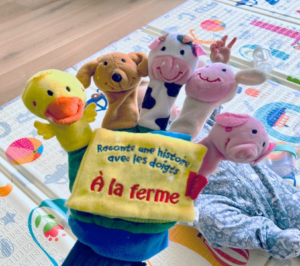 We could also use some accessories such as finger puppets (of animals, family members, etc.) that your little ones could touch which would be their way of participating, making them feel involved in the activity and contributing to cultivate their self-esteem. This also adds a visual that would further nurture their imagination.
We could also use some accessories such as finger puppets (of animals, family members, etc.) that your little ones could touch which would be their way of participating, making them feel involved in the activity and contributing to cultivate their self-esteem. This also adds a visual that would further nurture their imagination.
I usually tell some simple stories or list some fun facts or imitate animal sounds for example, while wiggling the puppets on my fingers.
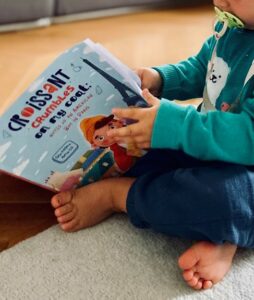 Let’s not forget books which, in my humble opinion, are one of the most effective ways to learn and expand vocabularies. Plus, nowadays books are more and more interactive with music or textured images or secret pockets that the babies could manipulate and therefore develop their senses and fine motor skills while still learning English or any other language.
Let’s not forget books which, in my humble opinion, are one of the most effective ways to learn and expand vocabularies. Plus, nowadays books are more and more interactive with music or textured images or secret pockets that the babies could manipulate and therefore develop their senses and fine motor skills while still learning English or any other language.
For those who have started to talk, it could be interesting to ask some open questions encouraging them to vocalize their thoughts. Playing “pretend” is also an opportunity to facilitate a spontaneous dialogue between you and your little learners which could be a bonding moment.
Overall, in order to optimize their learning skills and experience, it is important to take into account their attention and their engagement, to keep the interactions flow and to respect their pace. Rest, more precisely sleep, is also a key factor to develop their learning abilities in the best possible conditions. That’s when their brain processes and consolidates everything they’ve learned and experienced. This is why it’s important that we try our best to provide a safe and pleasant environment for them to reach their full potential and therefore allow them to cultivate their confidence and learn without pressure. But really, just keep it simple and fun. Those quality moments often create fond memories and connections. In the end, it’s the simplest and smallest things that really make a differ
ence and I do believe those are what really matters. That’s how we learn and grow.
Learn more about language acquisition, learning English at an early age and exposure to multilinguism (articles in French). You might also be interested in these activities and nursery rhymes in English.
By Tahina Rakotoarimanana, CAP student 2023-2024.



